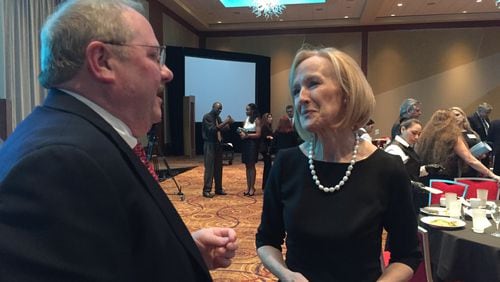This is posted on Monday, December 5, 2016 by Rodney Ho on AJC's Radio & TV Talk blog
Last week, esteemed PBS NewsHour anchor Judy Woodruff was inducted into the 2016 Atlanta Press Club Hall of Fame.
Joining her was long-time WAGA-TV news director Budd McEntee, Atlanta Inquirer creator John Smith Sr. and late Atlanta Journal-Constitution editor and columnist Eugene Patterson.
Woodruff, 70, began her broadcast career at then CBS affiliate WAGA-TV in 1970 and later worked out of Atlanta for NBC Nightly News.
"Altanta was the place where I cut my teeth," said Woodruff after the ceremony at the Cobb Energy Performing Arts Centre ballroom. "I learned how to do journalism. I learned how to report."
She saw role models in local journalists from that time including Ray Moore, Bob Brennan, 2013 Atlanta Press Club Hall of Fame inductee Bill Shipp and 2015 inductee Dick Pettys.
"They taught me how to go out and think about how to write a story, interview someone, why journalism matters," she said. "I went into this with stars in my eyes thinking that everybody else understands journalism, too. But not everybody understands journalism. It's up to us to remind the public all the time why we need to ask hard questions. Why we need to stick to some of these stories that people say, 'Why are you covering the tax bill or the highway bill or the water bill?' "
"No matter how dull or straight foward something is, it's your job to make it interesting and capture people's attention," she added. "That's something I never realized when I came in."
She said people at WAGA set great examples for her and pushed her hard. "I needed that. I didn't know anything," he said. "That gave me the confidence to do what I'm doing now."
Woodruff has been away from Atlanta for 40 years but has always felt a connection with this city. "This is my journalistic home," he said.
She later became a White House correspondent covering the Jimmy Carter presidency for NBC, followed by much of Ronald Reagan's first term. She has spent more than 20 years since then at PBS, plus a 12-year stint at CNN from 1993 to 2005. She currently co-anchors PBS NewsHour, which recently lost co-anchor Gwen Ifill, who passed away suddenly last month.
Rosalynn Carter gave Woodruff a tribute and stole her best story about how Woodruff met her future husband and fellow journalist Al Hunt (then at the Wall Street Journal, now at Bloomberg) at a baseball game the Carters had arranged between their staff and the journalists. Yes, the Carters even brought couples together.
Here's her induction video from the event, created by WXIA-TV's Jon Shirek and Richard Crabbe of Kettle Creek Media:
Budd McEntee is not a household name outside of journalism circles but in Atlanta broadcast circles, he is revered.
He was news director for 19 years at WAGA-TV, first while it was a CBS affiliate, then as a Fox affiliate through 2010.
"I was really thrilled" by the honor, McEntee said after he accepted the award. "I was so humbled they'd even think of me... These people were just outstanding. I would never have a newsroom like that again. This was the cream of the crop."
Bud Veazey, his assistant news director who retired in 2008, said he was tough and competitive yet fair. "He only threw me out of his office once," he said. "And he was right to do it! We get along great. He's my yang to my yin."
I wrote about McEntee's departure from Fox 5 in 2010.
A past president of the Atlanta Press Club, McEntee built up Fox 5's fabled I-Team, solidified its 10 p.m. newscast and added more hours of local TV news than any other affiliate.
I-Team veteran Randy Travis, who worked with him all 19 years McEntee was the boss, said he was "a dedicated, determined, dependable stick of dynamite. You always knew he'd give you immediate feedback, good or bad. We never operated in a vacuum. He gave me one of the gifts of my career is moving me to the I-Team."
Dale Russell, another I-Team stalwart, introduced McEntee, noting how fiercely competitive he was. "He set the bar very high for all us," he said.
He recalled getting beat on a story by WSB and getting called on the carpet for it by McEntee. He spent an hour playing catch up and felt good about putting something decent out at 6. When he next saw McEntee, he was still fuming. "What do you have for 10?" he yelped. That's how things rolled under McEntee.
And as Russell noted, McEntee fought the suits when Fox took over in 1994 and ensured the I-Team not only survived but grew the staff, winning copious awards over the years.
The video below includes some great promo video that highlights many of the big WAGA stars over the years.
John Smith Sr. created the Atlanta Inquirer, a black-owned newspaper, in the early 1960s during the heart of the civil rights era.
At the time, the paper was a way for the Atlanta Student Movement to get its voice out when mainstream and even black press wouldn't.
In poor health, Smith came on stage in a wheelchair and an oxygen tank. As he thanked the crowd, he at times had to pause to take in a breath or two. He was visibly emotional and deeply grateful for being recognized.
Eugene Patterson, who passed in 2013 at age 89, won the Pulitzer Prize in 1967 for column writing. For eight years from 1960 to 1968, he wrote a column every day for the Atlanta Constitution, with a heavy focus on civil rights.
"He was a man of great conviction and courage," said civil rights legend Xernona Clayton, who introduced him. "He truly believed that we as blacks and whites could get along in this society. He spoke directly to white Southerners and urged them to accept equality between all races."
She told a story about how Mr. Patterson, after Martin Luther King Jr.'s death, played liaison between then presidential candidate Richard Nixon and her. Nixon wanted to visit Coretta Scott King to offer his condolences but he wasn't sure if she'd want to receive him given King's feelings about Nixon before he died. Ultimately, Clayton convinced King that Nixon should come, as long as it was incognito. And he followed the rules and even offered to pay the college educations of their four children.
His two grand-daughters accepted the award on his behalf.
Read his most famous column from 1963 after the Birmingham church bombing called "A Flower for the Graves."
At the Washington Post as managing editor, he convinced publisher Katherine Graham to publish the Pentagon Papers.
Disclosure: I have been a board member of The Atlanta Press Club since 2009.
About the Author







